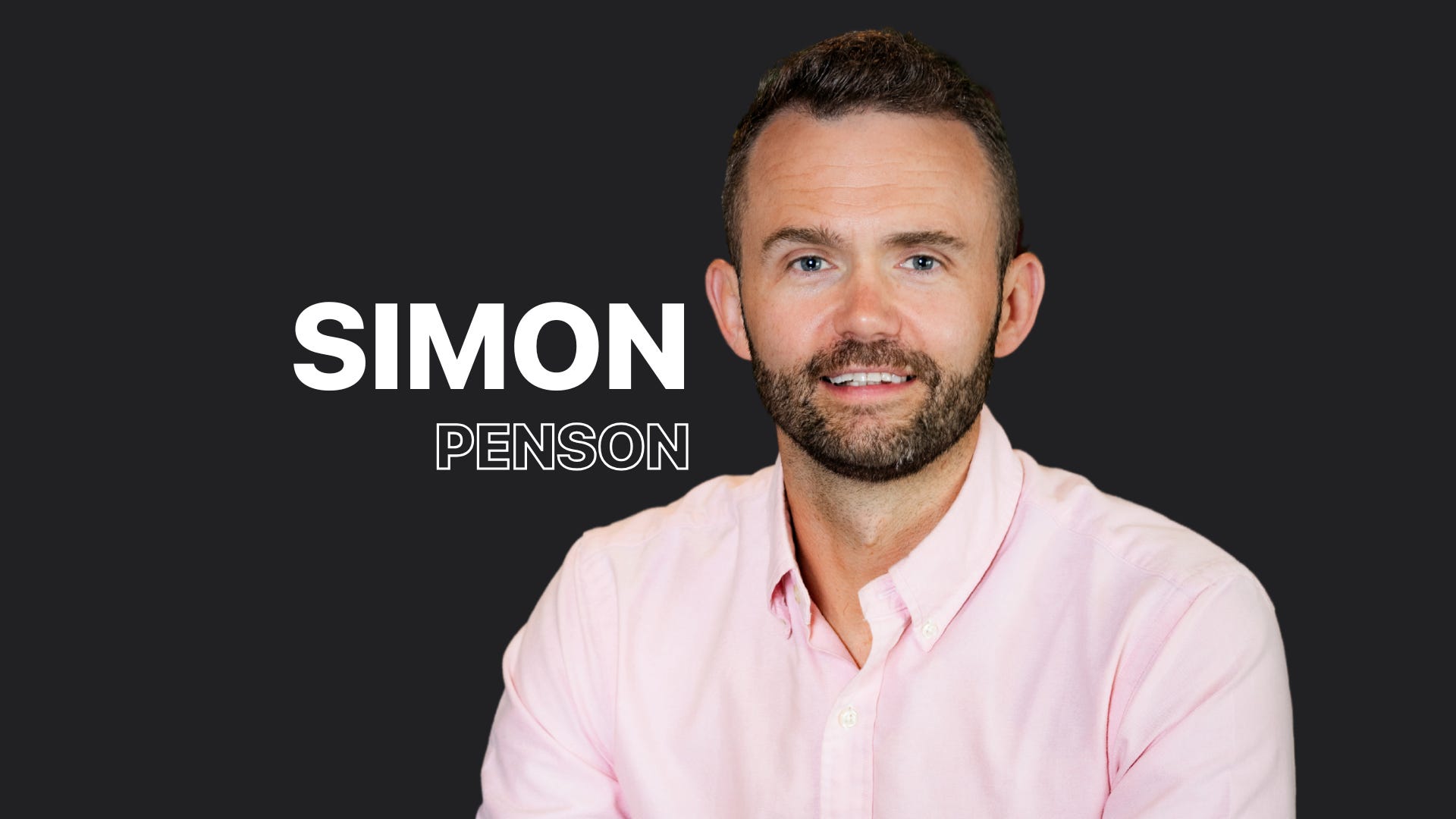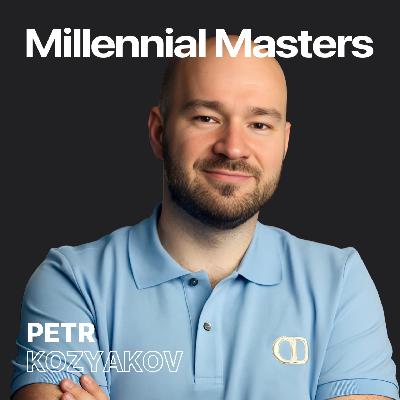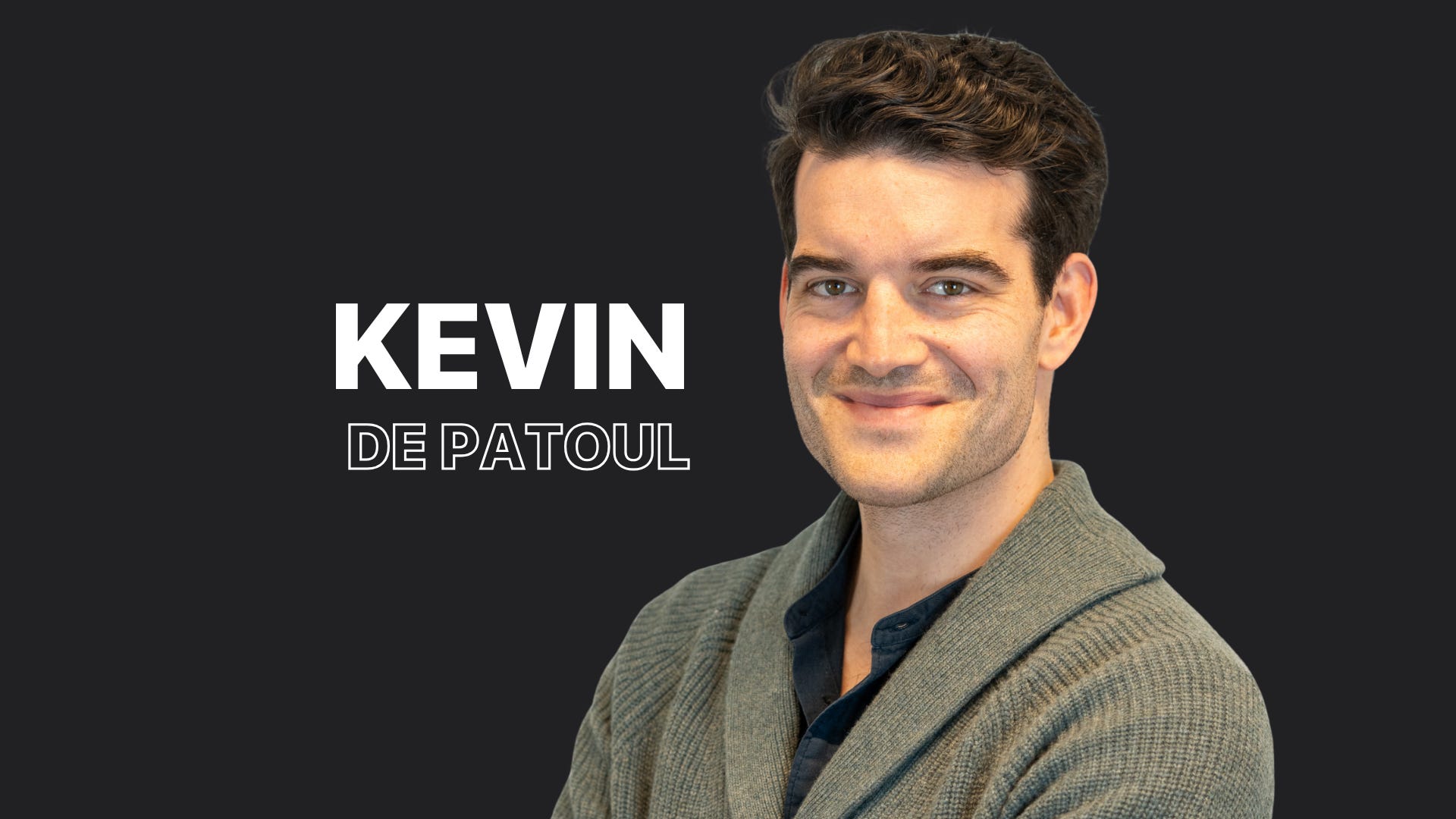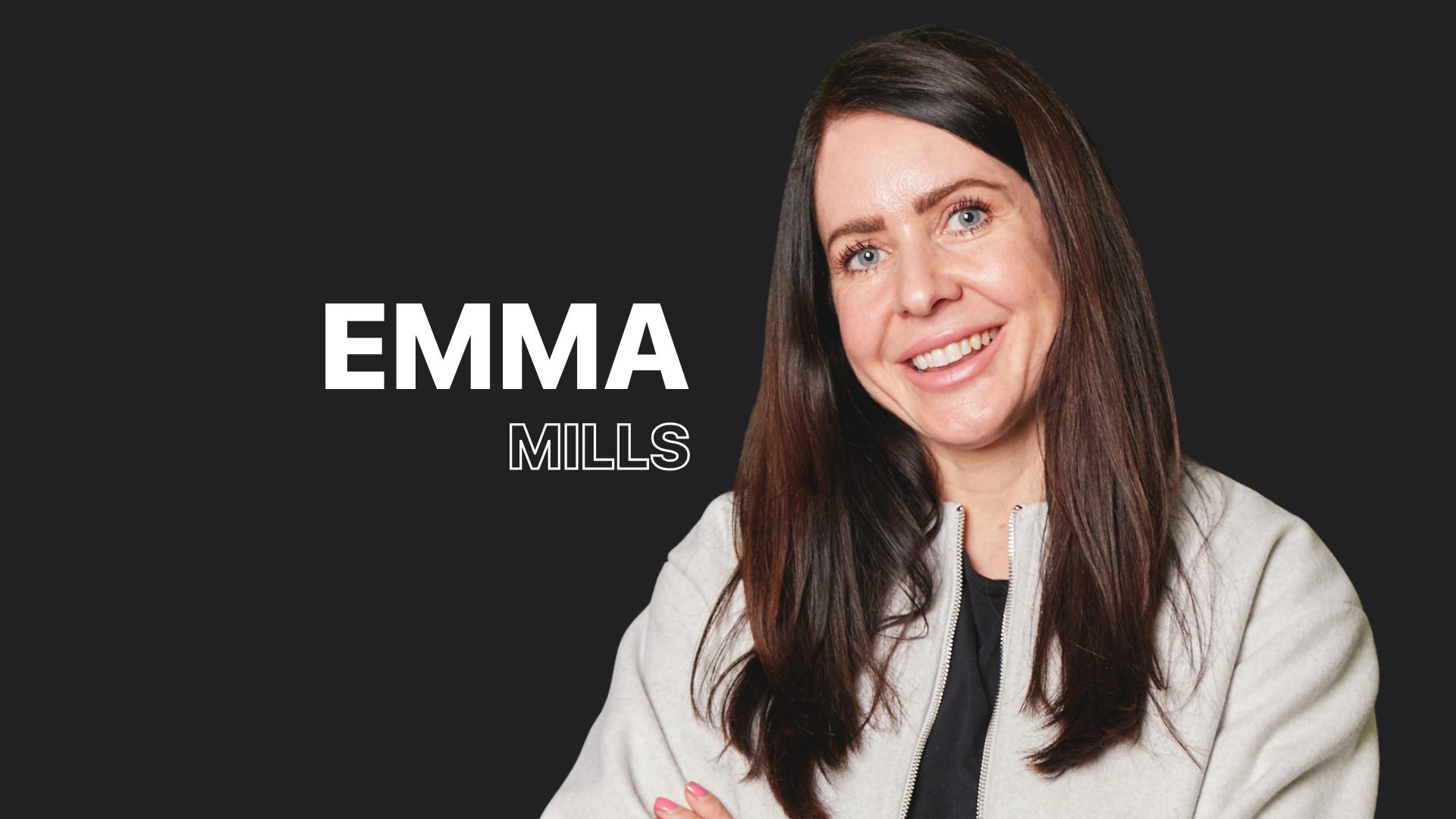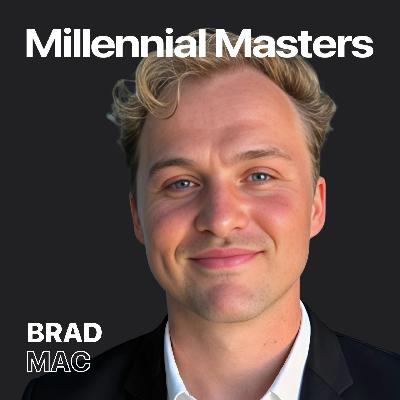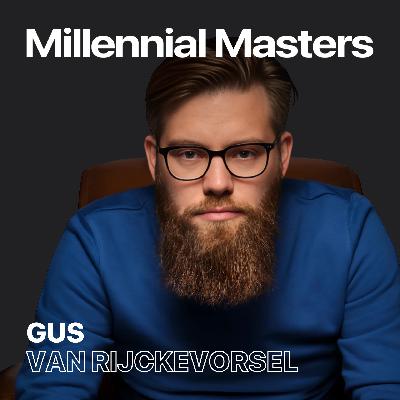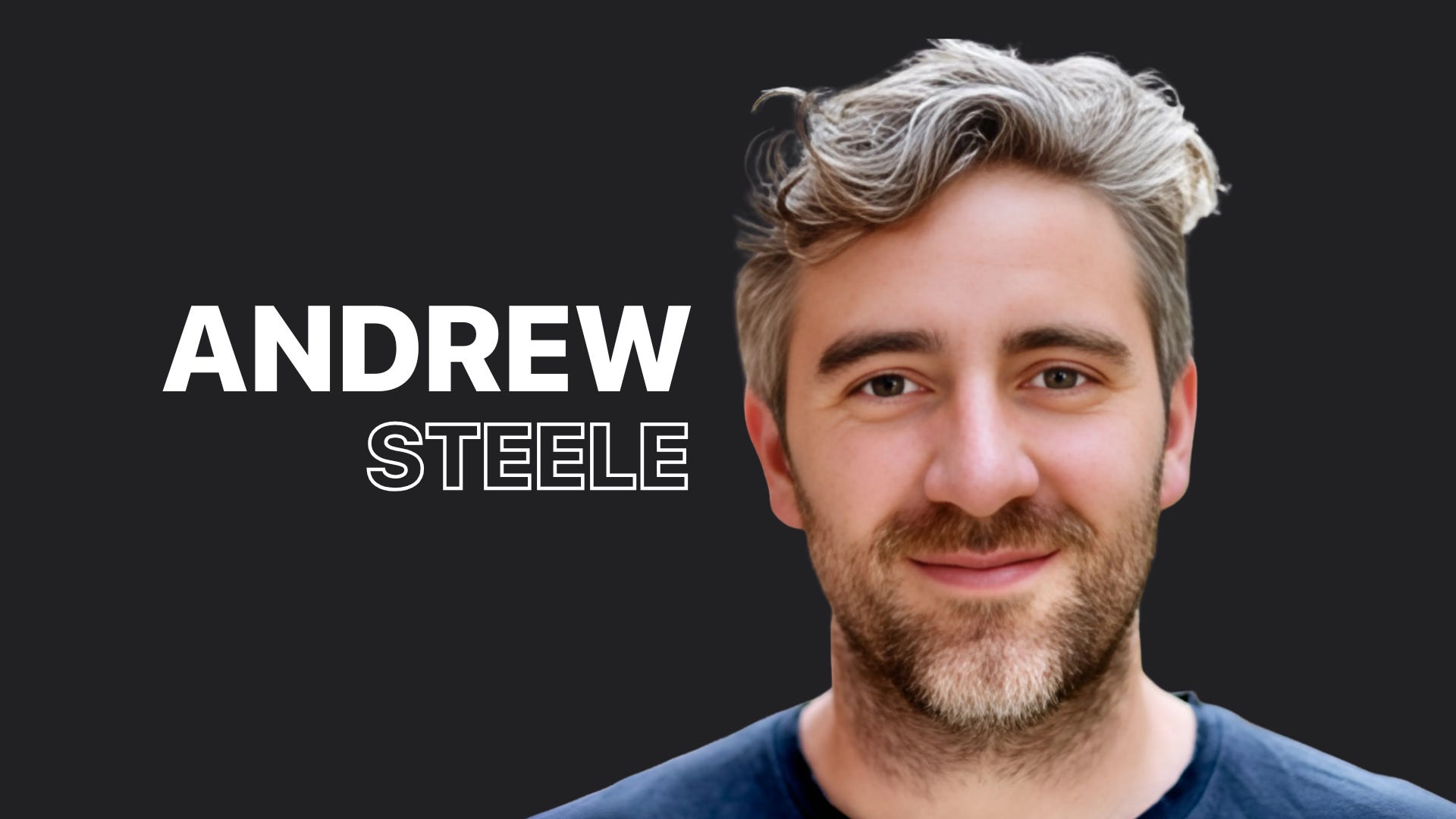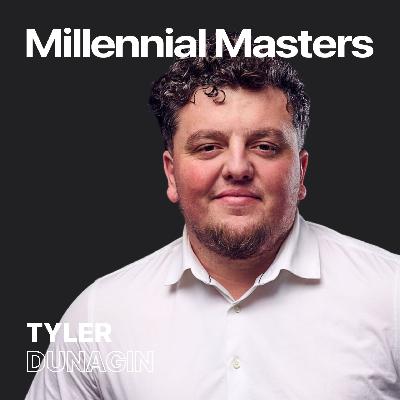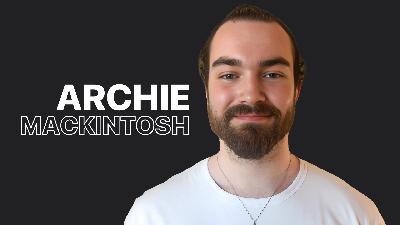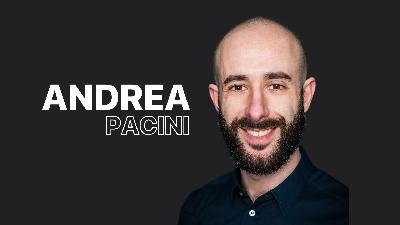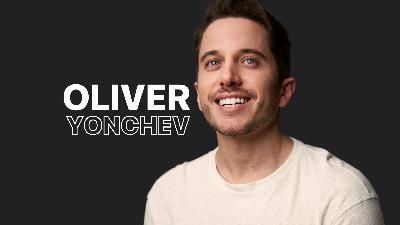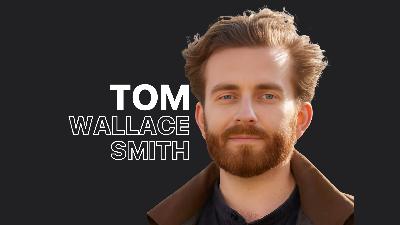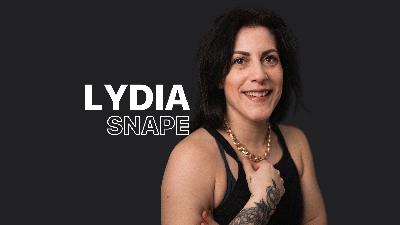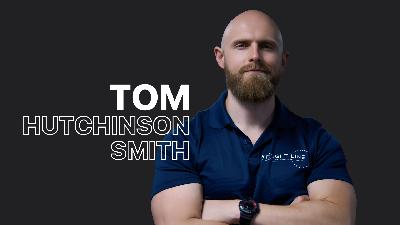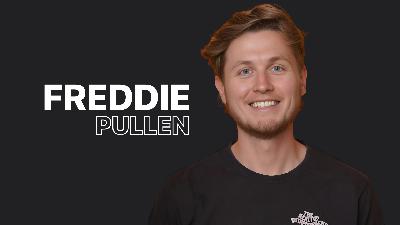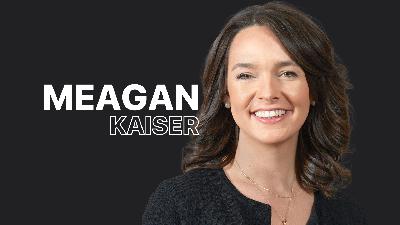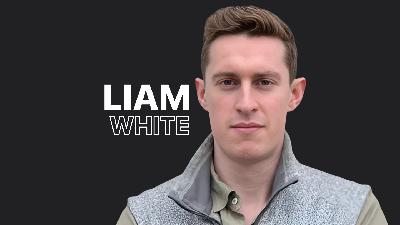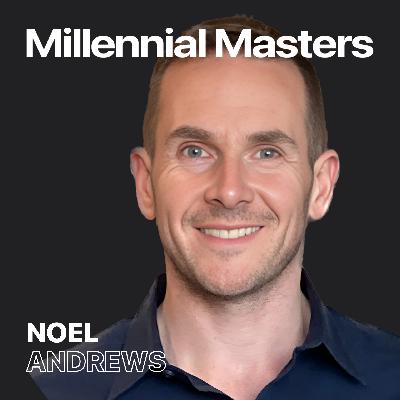Discover Millennial Masters
Millennial Masters

Millennial Masters
Author: with Daniel Ionescu
Subscribed: 1Played: 7Subscribe
Share
© QWERTY Media Ltd
Description
Real talk, real tips. Tune in for insights from millennial entrepreneurs and leaders on business, productivity, and personal growth you can use today.
millennialmasters.net
millennialmasters.net
46 Episodes
Reverse
📺 Watch now on Substack or YouTube | 🎧 Listen on Spotify or Apple Podcasts— Millennial Masters is sponsored by Jolt ⚡️ Reliable hosting for modern buildersSimon Penson went from journalist to exited entrepreneur, building one of the UK’s fastest-growing digital agencies and selling it in a £20m deal to one of the world’s biggest advertising groups.In this episode, he opens up about the hidden costs of scaling, from early hires who become blockers, to the harsh reality of earn-outs that can make or break your outcome.Now through Scaled, Simon helps B2B companies and scale-ups navigate the same challenges, bringing the perspective of someone who has lived the highs and lows of growth.This one’s all about what really happens when growth hurts, and what it takes to get to the other side.🔗 Find Simon on LinkedInTakeaways from Simon’s episode1️⃣ Early hires won’t always scale with youThe people who got you off the ground can become blockers later. Spot it early, have a plan, and know when to move them into the right role… or off the bus.2️⃣ Culture isn’t a nice-to-have, it’s survivalScaling breaks things fast. Without clear values and accountability, you’ll carry people you shouldn’t. The hard calls on culture usually come too late.3️⃣ Earn-outs are a trap if you’re not preparedDon’t separate price from terms. Structure interim payments, get specialist advice, and back yourself only if you control the levers that drive growth.4️⃣ Know your growth plateausBusinesses don’t scale in straight lines. Each stage brings a ceiling, breaking through means building specialist “generals” in ops, sales, finance, and strategy.5️⃣ Bootstrap vs raise is a life decisionDon’t raise money for the sake of it. Sometimes a bootstrapped £20m exit is better than chasing £100m with heavy dilution. Define what success looks like for you.📖 Simon’s book recommendationsOn Strategy by Boston Consulting Group — Simon credits this old-school classic with shaping how he thought about scaling in a structured way. It gave him a framework for understanding growth stages and building with intent, lessons he still draws on today even if the examples feel dated.In this episode we cover:00:00 Introduction to Simon Penson02:03 From Journalism to Digital Entrepreneurship05:00 Building and Scaling Zazzle08:01 Navigating Growth Challenges10:06 The Importance of Culture in Business12:14 Merging for Success15:33 Understanding Earn-Outs18:46 Key Metrics for Business Valuation21:05 Coaching and Investing in Startups23:06 AI's Impact on Marketing26:47 Rapid Fire Insights Get full access to Millennial Masters at millennialmasters.net/subscribe
📺 Watch now on Substack or YouTube | 🎧 Listen on Spotify or Apple Podcasts— Millennial Masters is sponsored by Jolt ⚡️ Reliable hosting for modern buildersConfidence isn’t free. As Lauren Currie puts it, “as your confidence increases, you will lose people.” She’s built Upfront into a global movement helping thousands of women step onto stages, into boardrooms, and into leadership roles that were never designed for them.In this episode, Lauren shares the reality of building confidence as a muscle, not a finish line. We explore tall poppy syndrome, the myth of imposter syndrome, and why visibility has financial consequences for founders and leaders.With six ventures behind her, Lauren has learned how to turn discomfort into growth, and how to keep ambition alive in systems that try to punish it. Her work shows that ambition is not a dirty word, but an engine for change.🔗 Find Lauren on LinkedIn and InstagramTakeaways from Lauren’s episode1️⃣ Confidence is costlyConfidence comes with trade-offs. As Lauren says, the more confident you become, the more some people will push back. Your growth exposes their stagnation. Recognising that this resistance is about them, not you, helps you keep moving forward.2️⃣ Imposter syndrome is a system, not a flawLauren rejects the idea that imposter syndrome is a personal failing. She sees it as a rational response to being the “only” in the room: the only woman, the only young person, the only outsider. It’s a signal you’re challenging the status quo, not proof you don’t belong.3️⃣ Ambition isn’t something to apologise forAmbition in men is celebrated, in women it’s often criticised. Lauren argues that ambition should be embraced as a force for change. You don’t have to dial it down or package it in humility to make others comfortable.4️⃣ Visibility is financialGood work doesn’t speak for itself. Leaders who stay invisible risk missing out on promotions, opportunities, and income. Visibility isn’t about ego, but about learning in public and advocating for your work before you feel ready.5️⃣ Design your trade-offs with intentionLauren avoids the trap of chasing “work–life balance.” Instead, she makes intentional choices about trade-offs, guided by her values. Whether it’s work on a Saturday or time with family, the decision is conscious, not default.In this episode we cover:00:00 Introduction to Lauren Currie02:05 Building Confidence as a Muscle04:36 The Journey of Upfront12:29 Entrepreneurial Pathways and Lessons Learned18:46 Understanding Imposter Syndrome24:43 Practical Steps to Build Confidence27:17 The Cost of Confidence29:21 Navigating Ambition and Gender Dynamics35:08 Embracing Life's Seasons35:57 Intentional Living and Values40:33 Effective Remote Team Management44:28 Visibility and Personal Branding48:31 Building Confidence and Overcoming Fear50:26 Reflections on Sacrifice and Legacy Get full access to Millennial Masters at millennialmasters.net/subscribe
📺 Watch now on Substack or YouTube | 🎧 Listen on Spotify or Apple Podcasts— Millennial Masters is sponsored by Jolt ⚡️ Reliable hosting for modern buildersPetr Kozyakov didn’t set out to build a crypto company. He set out to solve a problem. After struggling to make a simple cross-border payment, he realised the gap in how money moves, and turned that frustration into Mercuryo, a 300+ person fintech bridging crypto and traditional finance.He talks candidly about building a culture that survives hypergrowth, learning where not to waste energy, and the habits that keep him grounded as both a founder and a father. This is the human side of fintech leadership, told by someone scaling at global level.🔗 Find Petr on LinkedInTakeaways from Petr’s episode1️⃣ Energy is better spent buildingPetr learned that proving a point or winning an argument drains momentum. Direct that energy into collaboration and creation instead.2️⃣ Culture can’t be compromisedEven in hypergrowth, Mercuryo cut loose “A-players” who didn’t fit the culture. Skills don’t outweigh behaviour, because misalignment poisons the team.3️⃣ Growth requires constant adjustmentEvery stage of Mercuryo demanded a shift in focus, from landing the first customer, to building new products, to hiring leaders and keeping hundreds of people aligned. What worked at 20 people no longer worked at 300.4️⃣ Create their own expertsIn crypto, there were no ready-made compliance veterans. Petr hired open-minded people from traditional finance and helped them grow into crypto specialists, turning a gap into an edge.5️⃣ Founders need real recoveryFor Petr, daily workouts, strict sleep routines, and quality time with family are non-negotiables. Burnout kills judgement, and no fintech playbook will save you from it.In this episode we cover:00:00 Introduction to Petr Kozyakov02:34 The Transaction That Started A Business04:17 Bridging Crypto and Fiat: Making Transactions Easy07:16 The Evolution of Crypto: From Niche to Mainstream09:36 Use Cases for Crypto: Beyond Just Investment14:19 Building a Team: Culture and Hiring Principles17:17 Scaling Challenges: Lessons from Growth23:05 Navigating Compliance: The Regulatory Landscape28:38 Control, Focus and Delegation32:24 Systems to Manage Remote Teams35:02 Finding Balance: Personal Sacrifices and Well-being43:35 Advice for Future Founders: Learning from Experience Get full access to Millennial Masters at millennialmasters.net/subscribe
📺 Watch now on Substack or YouTube | 🎧 Listen on Spotify or Apple Podcasts— Millennial Masters is sponsored by Jolt ⚡️ Reliable hosting for modern buildersKevin de Patoul walked away from a secure consulting career to build Keyrock, a digital asset firm that’s now raised over $80 million and employs nearly 200 people worldwide. His mission is to create the infrastructure that will power the next generation of financial markets.In this episode, Kevin breaks down the lessons from scaling a startup at hyper-speed, navigating volatile crypto cycles, and keeping a team aligned while the ground shifts under your feet.From capital raises and culture challenges to separating hype from true innovation, this is an inside look at what it takes to build in one of the most unpredictable industries in the world.q2🔗 Find Kevin on LinkedInTakeaways from Kevin’s episode1️⃣ The real prize is infrastructureKevin argues that real innovation in crypto isn’t the latest meme coin, but the infrastructure that allows value to move securely and at scale. Founders should focus on solving fundamental problems, not chasing trends.2️⃣ Growth puts culture under strainKeyrock jumped from 3 to 160 people in a year. Processes collapsed and culture bent. Only clear values kept things intact.3️⃣ Crypto is 24/7. You can’t beThe market never switches off. Founders have to. Kevin enforces boundaries and trusts systems to carry the load.4️⃣ Big raises raise the stakesRaising $80 million didn’t ease the journey. It made every choice heavier. Kevin stresses discipline and investor alignment over chasing growth at any cost.5️⃣ Volatility rewards the steadyMost fear chaos. Kevin looks for openings. If you can adapt quickly, stay grounded, and keep delivering value, the market cycles can actually accelerate growth.In this episode we cover:00:00 Introduction to Kevin de Patoul01:58 From Consulting to Crypto: A Career Shift04:53 Understanding Keyrock: The Investment Bank for Digital Assets07:33 Debunking Misconceptions: Crypto vs. Digital Assets10:33 The Real Innovation of Tokenization13:28 The Future of Asset Ownership: Tokenization Explained16:16 Disruption or Replication? Crypto's Impact on Traditional Finance19:02 The Future of Crypto: Accessibility for All21:45 The Long-Term Viability of Crypto24:04 Building Keyrock: Lessons from Rapid Scaling29:07 Hiring for Mindset Over Skills34:53 Managing a Remote Team40:11 Building Team Cohesion41:22 Lessons from Fundraising50:20 Balancing Work and Life54:17 Sacrifices on the Entrepreneurial Journey Get full access to Millennial Masters at millennialmasters.net/subscribe
📺 Watch now on Substack or YouTube | 🎧 Listen on Spotify or Apple Podcasts— Millennial Masters is sponsored by Jolt ⚡️ Reliable hosting for modern buildersThis week’s Millennial Master is Emma Mills, founder of MiPA.Emma started out answering calls and managing inboxes. Seventeen years later, she built MiPA into a seven-figure executive assistant business serving more than 500 clients. Along the way, she’s learned how to protect her own time, escape the bottlenecks, and build a culture that scales.In this episode, Emma shares the systems, mindset shifts, and non-negotiables that help founders focus on the work they actually enjoy. From default diaries and “winning the week” to delegating outcomes instead of tasks, she’s all about reclaiming your calendar and growing without burning out.🔗 Find Emma on LinkedIn and YouTubeTakeaways from Emma’s episode1️⃣ Delegate outcomes, not just tasksAn executive assistant isn’t there to tick boxes, they should drive results. Give them ownership of outcomes, whether that’s launching a project, chasing overdue actions, or clearing bottlenecks, and free yourself to focus on high-value work.2️⃣ Design your default diaryMap out your ideal week in advance and protect it. Emma keeps three days completely meeting-free, with set slots for calls and internal meetings, so she can focus on creative, strategic work that actually moves the business forward.3️⃣ Your inbox is the best place to startFor most founders, the inbox is a time sink and a window into their priorities. Hand it over early, with a clear system, so someone else can triage, respond, and keep the important things moving while you’re doing higher-value work.4️⃣ Clarity kills distractionThe biggest “time thief” (no, not social media) is not knowing exactly what you’re trying to achieve. Set quarterly goals, break them down into weekly priorities, and make sure they’re visible to your team so everyone’s aligned.5️⃣ Protect your energy with boundariesEmma builds in recharging rituals throughout the day, keeps personal time in her calendar, and routes most requests through her EA. Boundaries are about ensuring the work you do is energising and sustainable.In this episode we cover:00:00 Introduction To Emma Mills01:55 From Assistant to Entrepreneur07:24 The Importance of Delegation12:33 Mastering Time Management18:04 The Art of Effective Delegation23:36 Learning from Delegation Mistakes32:29 Radical Honesty & The Cost of Mistakes37:27 Hiring: Spotting Red Flags41:58 AI's Role in Business Efficiency46:45 Balancing Business & Personal Life53:07 Lessons from Leadership: Insights from Ralph54:58 Sacrifices For Success01:00:06 Advice To Younger Self Get full access to Millennial Masters at millennialmasters.net/subscribe
📺 Watch now on Substack or YouTube | 🎧 Listen on Spotify or Apple Podcasts— Millennial Masters is sponsored by Jolt ⚡️ Reliable hosting for modern buildersThis week’s Millennial Master is Brad Mac, co-founder of Unreasonable.Most brands are burning cash on lazy ads and chasing the wrong metrics. Bradley McDonald (aka Brad Mac) thinks it’s time to do the opposite: cut the noise, go deep on what actually moves people, and treat creativity as a profit centre, not a gamble.He’s scaled Unreasonable into the marketing agency everyone’s watching, proving you can build a brand that lasts and still win on performance.🔗 Find Brad on LinkedInTakeaways from Brad’s episode1️⃣ Stop wasting your ad budgetMost brands throw 80% of their spend at branded search. Brad calls it a tax for being average. Put your money where it actually grows the business, not where you’re just protecting your logo.2️⃣ One killer campaign beats a thousand forgettable onesForget running endless ads. Brad’s strategy? Run a single, creative-led campaign that earns attention and compounds results over time.3️⃣ Chase goosebumps, not algorithmsGreat content gets remembered and shared. If your ads aren’t sparking a real reaction, you’re just adding to the noise.4️⃣ Hiring is everythingBrad only brings in “killers”, people who add value from day one. No long interview chains, just proof you can deliver.5️⃣ Brand is still kingPerformance tactics will only get you so far. The brands that last are the ones that stand for something and back it up with bold creative.📚 Brad’s book recommendationsOgilvy on Advertising by David Ogilvy — Brad’s go-to classic for anyone serious about brand and creative. He keeps coming back to Ogilvy’s principles on copywriting, positioning, and making ads that actually sell.Alchemy by Rory Sutherland — This one’s Brad’s cheat code for creative thinking. He loves how Sutherland breaks the rules and shows why the best marketing ideas never come from pure logic.Deep Work by Cal Newport — Brad rates this as essential reading for founders and creatives. He credits Deep Work with helping him carve out real focus time, even when agency life gets chaotic.Slow Productivity by Cal Newport — A new favourite, Brad’s been testing out Newport’s approach to getting more done by slowing down, working deeper, and ignoring the usual busywork.Poor Charlie’s Almanack by Charlie Munger — Brad swears by Munger’s mental models for sharper decision-making. He’s picked up plenty of counterintuitive lessons on how to scale, invest, and stay rational.In this episode we cover:00:00 Introduction to Brad Mac02:06 The Unreasonable Origin Story08:01 Transitioning to Unreasonable10:12 The State of Performance Marketing13:34 Measuring Success in Marketing17:04 Creating Lasting Brands23:29 The Role of AI in Marketing29:55 The Future of Growth Marketing33:45 Traditional Media's Place in Marketing36:22 Building a Brand in the Digital Age39:58 Underrated Marketing Channels45:55 The Power of Personal Branding48:14 Growing Unreasonable: Hiring and Culture57:17 Navigating Client Relationships01:00:45 Creating a Productive Work Environment01:02:16 Maintaining Sanity in a Fast-Paced World01:08:01 Quickfire Questions: Insights and Advice Get full access to Millennial Masters at millennialmasters.net/subscribe
📺 Watch now on Substack or YouTube | 🎧 Listen on Spotify or Apple Podcasts— Millennial Masters is sponsored by Jolt ⚡️ Reliable hosting for modern buildersAugustin ‘Gus’ van Rijckevorsel has built his career on bold bets and stubborn ambition.By his 30s, he’d launched seven companies: some collapsed in spectacular fashion, others scaled fast enough to put him on the radar of Europe’s top investors.Gus is the kind of founder who hacks the system, takes bets most would avoid, and believes the only real risk is standing still.Now, as CEO at Ultra, he’s aiming to build the “Netflix of gaming” out of Europe.In this episode, Gus shares the unfiltered reality behind the founder journey.🔗 Find Gus on LinkedIn and XTakeaways from Gus’ episode1️⃣ Vision is a distortion and reality keeps you in businessFounders survive on a healthy dose of delusion, but long-term success demands you confront the facts, not just your ambitions.2️⃣ If you pay peanuts, you get monkeysCut corners on hiring and you’ll regret it. Quality people are the only thing that matters.3️⃣ Layoffs and failure never get easier, only more publicYou’ll go from hero to villain overnight, and sometimes you’ll have to make impossible calls. Learning to live with the emotional fallout is part of the founder’s job description.4️⃣ Entrepreneurs take bets, business owners play it safeReal entrepreneurs chase scale and put everything at risk to get there. If you’re clinging to ownership, you’re not growing, you’re just maintaining.5️⃣ The biggest risk is standing stillSpeed is the new survival skill. You don’t have a decade to prove yourself. If you’re not moving fast, you’re moving backwards.In this episode we cover:00:00 Introduction To Gus van Rijckevorsel02:10 From Success To Failure And Back At It07:48 Learning from Failures11:15 The Importance of Mindset and Support16:22 Identifying Opportunities in Business25:33 The All-or-Nothing Approach30:54 Ultra: The Neflix of Gaming37:38 Navigating Gatekeepers in Technology39:55 Scaling And Fundraising44:30 Managing Remote Teams Effectively46:59 The Future of Europe's Tech Startup Scene51:22 AI's Impact on Game Development and Business59:09 Europe's Protectionism As An Advantage01:01:29 Lessons from Experience: Advice for Young Entrepreneurs01:05:37 Taking Bold Risks in Business Get full access to Millennial Masters at millennialmasters.net/subscribe
📺 Watch now on Substack or YouTube | 🎧 Listen on Spotify or Apple Podcasts— Millennial Masters is sponsored by Jolt ⚡️ Reliable hosting for modern buildersThis week’s Millennial Master is Jordan Stachini, Founder of Co & Co.Jordan never planned to be an agency boss. She went from flying around the world in high-pressure marketing roles to starting a consultancy that, thanks to her “no BS” style and obsession with results, quickly snowballed into a boutique agency with clients across the globe.She’s honest about slow, sustainable growth, why she turns down outside investment, and how setting boundaries keeps her business and life in check.🔗 Find Jordan on LinkedInTakeaways from Jordan’s episode1️⃣ Boundaries are a superpowerJordan built her agency by being brutally selective about clients, projects, and pace, protecting her team and sanity over chasing revenue at any cost.2️⃣ “No” beats “yes” for real growthTurning down rapid scaling and outside investment wasn’t risk-averse, it was strategic. Slow, organic growth led to a more stable, enjoyable business.3️⃣ Zero-BS marketing wins clientsJordan’s “no fluff, all results” approach stands out. She’s upfront about what works, what doesn’t, and refuses to deliver anything half-baked, even if it means saying no to more work.4️⃣ Personal brand > agency brandCo & Co thrived because Jordan invested in her own voice online, then encouraged her team to do the same. Employee brands are amplifiers, not risks.5️⃣ Apprenticeships > grads (for her team)She sparked LinkedIn controversy by refusing to hire grads straight out of uni, opting for apprentices with drive and hands-on mindset. Her stance? Mindset and learning agility beat paper credentials.Don’t miss the next episode. Subscribe! 🌟In this episode we cover:00:00 Introduction to Jordan Stachini02:18 The Journey From Employee to Entrepreneur07:11 Navigating Lockdown: Adapting to New Realities13:45 Choosing Clients: The Importance of Fit18:41 No BS Marketing: The Philosophy Behind Co & Co27:51 Hiring for Mindset: The No Graduates Stance33:02 The Value of Constructive Criticism43:11 Navigating the Loneliness of Entrepreneurship51:12 Maintaining Routine and Productivity58:04 Sacrifices on the Path to SuccessProtect your time. Share this. 🔒 Get full access to Millennial Masters at millennialmasters.net/subscribe
📺 Watch now on Substack or YouTube | 🎧 Listen on Spotify or Apple Podcasts— Millennial Masters is sponsored by Jolt ⚡️ Reliable hosting for modern buildersAndrew Steele is the founder who went from Olympic medal sprints to building startups with nothing but a risk appetite, relentless honesty, and a knack for ignoring the “safe” option.After a decade chasing medals, he fell into tech with zero business experience, helped turn DNAfit into a global health brand, stuck it out through an IPO, and is now back at it with Stride: a membership for people who want to know what’s really happening inside their bodies before the problems start.In this episode, Andrew lays out the realities of going from athlete to first-time founder, scaling up on bootstrapped budgets, and learning to handle rejection like a sport.🔗 Find Andrew on LinkedInTakeaways from Andrew’s episode1️⃣ The real founder traits aren’t on your CVAndrew credits his Olympic background for his startup resilience, but it’s not just discipline. Traits like a high appetite for risk, comfort with failing in public, and a pinch of “cheekiness” (bending the rules to get results) are what early-stage investors actually look for.2️⃣ Your next move is rarely by designAndrew’s whole founder journey started with a single cold email. Forget perfect plans; most breakthroughs happen because you give yourself permission to try and improvise, even when you’re unqualified.3️⃣ Bootstrapping teaches hard lessons fastHe scaled his first business, DNAfit, to acquisition without raising a penny, learning that bootstrapping means living in survival mode, saying yes to anything that pays, and improvising on a shoestring. Only later, with Stride, did he blend this grit with external funding (but only after hitting millions in revenue).4️⃣ IPO is a milestone, not the finish lineGoing public with Prenetics was surreal, but Andrew admits it’s not some magical exit: operational headaches just get bigger and you’re forced to trade speed for structure. The hustle doesn’t stop when you ring the bell.5️⃣ You never really “arrive”Even after an exit and a public listing, Andrew found himself restless. Real fulfilment came from building again — proof that for founders, progress (not arrival) is the real drug.📚 Andrew’s book recommendationEast of Eden by John Steinbeck — Andrew credits East of Eden for shaping his mindset as both an Olympian and entrepreneur. There’s a powerful idea buried in its pages: don’t wait for someone else to grant you permission. Give yourself the “permission to try,” whether you’re staring down the Olympic track or launching a startup with zero experience. It’s a reminder that progress comes from putting yourself out there, even when you don’t feel fully qualified.In this episode we cover:00:00 Introduction to Andrew Steele02:15 The Intersection of Sports and Entrepreneurship08:28 The Journey from Athlete to Entrepreneur14:18 Scaling a Startup: Challenges and Triumphs18:21 Navigating Corporate Culture Post-Acquisition24:19 Hiring and Firing: Building a Strong Team28:55 The IPO Experience and Its Aftermath33:14 Building Stride: A New Venture in Health39:16 The Role of Health Systems in Preventative Care46:01 Navigating the Fundraising Landscape53:14 Habits & Routines to Stay Grounded & Productive01:01:08 Reflections on Sacrifice and Success Get full access to Millennial Masters at millennialmasters.net/subscribe
📺 Watch now on Substack or YouTube | 🎧 Listen on Spotify or Apple Podcasts— Millennial Masters is sponsored by Jolt ⚡️ Reliable hosting for modern buildersTyler Dunagin never set out to become “the bathtub guy,” but that’s what happens when you turn burnout into a platform business and outpace almost everyone around you.After growing up in an entrepreneurial family, Tyler hustled his way from odd jobs to flipping houses, only to hit the wall. He rebooted, switched from working on homes to scaling businesses, and now runs Turnserv, one of the fastest-growing property service companies in America. His secret is relentless self-development, radical transparency with his team, and a knack for finding opportunity at the edges.Tyler’s story is about scaling, the reality of letting go, building real systems, and turning obsession into something sustainable.🔗 Find Tyler on LinkedIn and InstagramTakeaways from Tyler’s episode1️⃣ Delegate with intentWork out exactly what only you can do, and hand off everything else, then let go. This is the only way to break free from founder bottleneck syndrome and actually scale.2️⃣ Equity drives loyalty:Give your managers real skin in the game if you want them to act like owners. Equity isn’t just a perk, it’s how you build a leadership team that thinks long term.3️⃣ Work-life “integration” winsScrap the myth of perfect balance. Blend work and family, but set your own rules. Being present, wherever you are, matters more than sticking to anyone else’s schedule.4️⃣ KPIs prevent burnoutClear goals for your team = freedom for you. No KPIs? You’ll end up micromanaging. Weekly targets and reports keep you (and them) sane, so you can actually unplug.5️⃣ Personal brand = talent magnetYour reputation as a founder is a recruiting tool, whether you like it or not. Put yourself out there to attract ambitious people who share your values.Don’t miss the next episode. Subscribe! 🌟📚 Tyler’s book recommendationsDeep Work by Cal Newport — Tyler swears by Deep Work for founders who want to escape busywork and get meaningful things done. He credits it with helping him structure his days for real focus and strategic thinking.Edge Strategy by Alan Lewis and Dan McKone — This is the playbook behind TurnServe’s growth. Tyler recommends Edge Strategy for any founder wanting to spot business opportunities “within arm’s reach” and layer on new revenue streams without reinventing the wheel.In this episode we cover:00:00 Introduction to Tyler Dunagin02:22 The Relentless Entrepreneur: Origins and Inspirations08:11 Building TurnServe: The Birth of a New Venture16:35 Innovating with Liquid Liner: A Patented Solution21:56 Timing Is Key In Raising Private Equity27:21 Hiring for Success & The Art Of Delegation32:18 Core Values and Culture: The Heart of Team Dynamics39:17 The Impact of Equity on Employee Motivation45:21 The Role of Personal Branding in Attracting Talent48:53 Work Life Integration, Not Separation53:22 Habits To Prevent Burnout57:12 Sacrifices Made on the Entrepreneurial Path01:01:54 Injecting Growth into a Stagnant BusinessPass it on if you’re building big things 🔥 Get full access to Millennial Masters at millennialmasters.net/subscribe
📺 Watch now on Substack or YouTube | 🎧 Listen on Spotify or Apple Podcasts— Millennial Masters is sponsored by Jolt ⚡️ reliable hosting for modern buildersThis week’s Millennial Master is Archie Mackintosh, founder and coach at TruProductive.Archie doesn’t look like your typical productivity guru, and he’s not. He went from falling asleep in lessons and nearly dropping out of Cambridge to obsessing over neuroscience and building a new playbook for getting things done.His approach skips the hustle and strips back the “just work harder” noise. Instead, it’s about why your brain struggles with modern work, how burnout really happens, and what actually helps founders reclaim focus and energy.🔗 Find Archie on LinkedInTakeaways from Archie’s episode1️⃣ Productivity isn’t just outcomesChasing goals without learning to enjoy the process leads to burnout and a constant feeling of “never enough.” Agency, gratitude, and curiosity are the real levers.2️⃣ The brain is built for a different worldYour hunter-gatherer mind wasn’t wired for inboxes, spreadsheets, or Zoom calls. Understanding the mismatch helps you work with your biology, not against it.3️⃣ True rest means doing less, not moreMost founders think rest is wasted time, but purposeful breaks and “doing nothing” actually recharge focus and fuel creativity.4️⃣ Sleep is the ultimate performance hackDialling in your morning and evening routines is worth more than any supplement or productivity tool. Consistency is the magic ingredient.5️⃣ Personalisation beats every “productivity hack”There’s no universal routine. Knowing your own rhythms, experimenting, and tracking what actually works for you is how real change happens.In this episode we cover:00:00 Archie's Journey to Productivity07:59 Defining True Productivity13:42 Understanding Focus and Productivity17:16 The Science of Focus States22:40 Recharging Your Brain26:53 Practical Steps for Creativity33:21 Unlocking Creativity Through Sleep and Exercise35:44 Morning Routines for Better Sleep47:38 Caffeine: Timing and Effects51:02 Personalized Eating Windows for Optimal Energy56:26 The Timeline for Change: How Long to See ResultsDon’t miss the next episode. Subscribe to Millennial Masters. Get full access to Millennial Masters at millennialmasters.net/subscribe
📺 Watch now on Substack or YouTube | 🎧 Listen on Spotify or Apple Podcasts— Millennial Masters is sponsored by Jolt ⚡️ reliable hosting for modern buildersEvery founder knows the pain: killer idea, flat pitch. The harsh truth? Most pitches fail not because of the product, but because the story gets lost in translation. I’ve learned this the hard way, and so has Millennial Master Andrea Pacini, presentation coach, author, and the guy behind Ideas on Stage.This week, we break down what actually builds confidence on stage (spoiler: it’s not talent). Andrea reveals why complex language kills deals, the simple framework that top presenters use, and how you can turn nerves into your secret weapon. If you want investors, teams, or clients to pay attention, this is the episode to bookmark.🔗 Find Andrea on LinkedInTakeaways from Andrea’s episode1️⃣ Confidence is built, not bornFamiliarity and preparation are everything. The more you practise your pitch, the more confident you’ll feel. Andrea says talent is overrated.2️⃣ Message > deliveryNail your story before you obsess over body language or eye contact. A clear, compelling message is 80% of the work and presentation skills are the finishing touch.3️⃣ Ditch the jargonComplex words don’t make you sound smarter. Keep your language simple and your story punchy. If an eight-year-old can’t understand your pitch, it’s too complicated.4️⃣ The SCORE methodUse Andrea’s SCORE framework: Simple, Clear, Original, Related to the audience, and Enjoyable. If you hit all five, your pitch will land.5️⃣ Master the art of interactionDon’t drone on; get your audience involved. Whether you’re pitching in person or online, use regular, organic moments of interaction to keep people engaged and focused.📚 Andrea’s book recommendationsConfident Presenter — Andrea Pacini’s own playbook for mastering the art of public speaking and presenting with impact, packed with frameworks, practical examples, and stories from coaching founders, leaders, and TEDx speakers.Bonus: Andrea offers a free copy to UK listeners (physical) or a global PDF. Grab it here.Made to Stick by Chip & Dan Heath — A classic for anyone who wants their ideas to actually land. The Heath brothers break down why some messages go viral, while most fall flat, introducing the “curse of knowledge” and practical tips to make your story unforgettable.Brain Rules by John Medina — Science-backed insights on how our brains really work, from attention spans to memory and focus. Referenced for the “10-minute rule” in presentations, this one will change how you think about communicating (and keeping people awake).In this episode we cover:00:00 Introduction to Andrea Pacini02:22 The Foundation of Confident Presenting05:39 Common Pitfalls in Pitch Decks09:08 The Curse of Knowledge in Communication12:32 Simplifying Complex Ideas15:18 The SCORE Framework for Effective Presentations17:21 The Power of Repetition in Presentations20:05 Understanding Your Audience23:47 Preparing for Your Audience25:44 Tailoring Presentations for Different Contexts29:37 Engaging Virtual Presentations33:46 Creating Organic Audience Interaction37:25 Body Language and Presence43:37 Breathing Techniques for Presenters47:44 Leveraging AI in Presentations54:42 Crafting Powerful Closing Lines56:57 The Journey to Becoming a Confident Presenter01:00:57 Start Becoming A Confident PresenterDon’t miss the next episode. Subscribe on MillennialMasters.Net Get full access to Millennial Masters at millennialmasters.net/subscribe
📺 Watch now on Substack or YouTube | 🎧 Listen on Spotify or Apple Podcasts— Millennial Masters is sponsored by Jolt ⚡️ reliable hosting for modern buildersThis week’s Millennial Master is Oliver Yonchev, founder of cocreatd.What does it take to break out of low-aspiration roots, ride the startup rollercoaster from failed indie rocker to Social Chain and then build a venture studio in the middle of an AI revolution? For Oliver Yonchev, the answer is relentless ambition, and a kinda toxic work ethic.In this episode we get into everything:* Building your self-belief when everyone around you doubts* Why the US market nearly broke him, and how he bounced back* How AI is raising the bar (and wiping out mediocrity fast)* The truth about “sprints”, burnout, and why you should quit when you’re winning* The future for founders who don’t want to play it safePlus: raw takes on branding, building, and why co-founders still matter in the era of agents and automations.Tune in to the full episode, take notes, and don’t blame the country, you’ve got to raise your own bar.🔗 Find Oliver on LinkedIn, Instagram and at cocreatdTakeaways from Oliver’s episode1️⃣ Self-belief is the real startup superpowerYou’ll get more “no” than “yes”, so raise your aspirations, stay optimistic, and back yourself, even when nobody else does. For Oliver, self-belief turned low-aspiration beginnings into an entrepreneurial launchpad.2️⃣ AI is raising the bar and mediocrity is overAI isn’t just another trend. It’s killing average work, lowering the cost of building, and letting more founders move faster. If you’re not pushing for excellence, you’ll be left behind.3️⃣ Distribution still beats product, unless your product is 50x betterBuilding a great product is table stakes. You need viral loops, killer branding, or something truly different to get noticed. The best distribution hacks come from building something worth sharing.4️⃣ Quit while you’re ahead (really)Most people stick around too long. Oliver swears by “quitting is for winners”; use momentum to move to bigger things, not as a reason to get comfortable.5️⃣ Founders who adapt win, especially in the era of agents and automationThe old rules of loyalty and linear careers are gone. Build agency over your own life, experiment with side projects, and never outsource your drive to anyone or anything (even AI).📚 Oliver’s book recommendationsThe Hard Thing About Hard Things by Ben Horowitz — A classic on the realities of running a business, tackling the tough decisions and brutal truths most founders face.Zero to One by Peter Thiel — Deep, occasionally complex, but packed with sharp insights for anyone building something new.The War of Art by Steven Pressfield — A short but powerful book on overcoming resistance and procrastination—especially useful for anyone who switches modes or struggles with getting started.In this episode we cover:00:00 Introduction to Oliver Yonchev02:18 From Barnsley to Bartlett Co-Founder06:55 The Birth of Social Chain: A Facebook DM That Changed Everything15:56 Navigating the US Market: Lessons Learned22:00 Knowing When to Move On: The Decision to Start Again28:04 Co-Created: A New Venture Studio for Founders36:17 The UK Startup Ecosystem: Opportunities and Challenges38:50 UK Startup Investment Incentives and the Exodus to Dubai47:52 The AI Age and The Importance of Distribution56:32 Navigating the Competitive Landscape of Product Development01:02:49 Balance & Productivity While Hustling01:06:03 Tech Stack and Key Readings for EntrepreneursSubscribe on MillennialMasters.Net for fresh episodes and features in your inbox every week. Get full access to Millennial Masters at millennialmasters.net/subscribe
📺 Watch now on Substack or YouTube | 🎧 Listen on Spotify or Apple Podcasts— Millennial Masters is sponsored by Jolt ⚡️ reliable hosting for modern buildersTom Wallace-Smith never planned on becoming a deep tech founder. He started out in nuclear engineering, working on the technology that powers Britain’s submarines, then took a left turn into startups via a Zoom call and a wild idea.Today, as co-founder and CTO of Astral Systems, Tom is leading a team building compact fusion reactors: not to power the grid, but to tackle one of the most stubborn bottlenecks in cancer care: medical isotope shortages.Tom built Astral with a global team he didn’t meet in person for months, set out to generate revenue before chasing big VC rounds, and spent most of his twenties learning how to defend his vision against critics, investors, and his own doubts. Along the way, he’s had to grow from physicist to operator: hiring, firing, and figuring out how to build a mission-driven culture while scaling fast.In this episode, Tom opens up about what it really takes to build in deep tech, why commercial traction matters even in the hardest science, and the systems he’s put in place to protect his team and his own sanity.🔗 Find Tom on LinkedInTakeaways from Tom’s episode1️⃣ Mission beats hypeThe most resilient founders stay anchored to a genuine mission. For Tom, solving real-world problems, like cancer treatment shortages, matters more than chasing headlines or “moonshots”.2️⃣ Commercial traction isn’t optionalIn deep tech, revenue isn’t a side quest. Astral focused on getting paying customers early, proving that real business models beat endless fundraising sprints.3️⃣ Remote teams can build big thingsTom co-founded Astral before meeting his partner in person. Systems, trust, and relentless alignment turned a fully remote team into a commercial deep tech operation.4️⃣ Assertiveness is a founder’s muscleLeading a technical team means learning to defend your decisions and hold the line, especially when you’re younger or less experienced than your peers.5️⃣ Protect your bandwidthScaling quickly means setting up reviews, routines, and boundaries to safeguard your own mental health and keep the team running at its best. Tom uses note-taking, journaling, and meditation to stay focused and avoid burnout.📚 Tom’s book recommendationsVenture Deals by Brad Feld and Jason Mendelson – The go-to handbook for understanding startup fundraising, term sheets, and the language of venture capital. Tom suggests reading it before talking to any investor, angel or otherwise.Out of Your Mind (lecture series) by Alan Watts – Tom credits these talks for helping him reset, gain perspective, and find mental clarity. He revisits them every few years, always picking up something new.The Lectures of Richard Feynman – Tom finds Feynman’s lectures a masterclass in making complex topics engaging and accessible, a mindset he channels in both science and leadership.In this episode we cover:00:00 Introduction to Tom Wallace-Smith02:23 The Journey to Co-Founding a Deep Tech Startup09:50 The Birth of Astral and Remote Collaboration12:31 Navigating Co-Founder Dynamics and Trust16:23 Astral's Unique Approach to Fusion and Isotope Production18:04 Challenges in Nuclear Medicine and Supply Shortages20:47 Innovations in Fusion Technology and Its Applications23:55 The Future of Isotope Production and Empowering Research26:25 Long-Term Vision and Disruption in the Industry30:19 Navigating Stealth Mode: Growth and Funding Strategies36:17 Commercial Traction: Building Relationships and Securing Contracts42:32 The Art of Pitching: Lessons Learned48:03 Revenue-Driven Innovation: The Path to Breakeven53:48 Scaling Up: Team Dynamics and Hiring Challenges59:05 The Value of Fresh Perspectives in Startups01:02:34 Building a Remote and Hybrid Work Culture01:04:17 Developing Assertiveness as a Young Founder01:07:02 Sacrifices and Challenges of Startup Life01:12:08 The Importance of Hobbies and Self-Care01:14:13 Journaling and Mental Health01:17:55 Meditation and Mindfulness Practices01:21:23 Recommended Reads for Entrepreneurs01:23:37 Advice for Future EntrepreneursSubscribe free on MillennialMasters.Net for new features and episodes weekly. Get full access to Millennial Masters at millennialmasters.net/subscribe
📺 Watch now on Substack or YouTube | 🎧 Listen on Spotify or Apple Podcasts— Millennial Masters is sponsored by Jolt ⚡️ reliable hosting for modern buildersAsk any Millennial Master what really matters as you grow, and most will say the same thing: scale means nothing if you lose your soul.This week, I’m joined by Lydia Snape former rock band frontwoman turned hospitality entrepreneur, who set out to prove you can grow fast and keep your values.As owner of Warwick Street Kitchen, Lydia built a business around the radical idea that great coffee and great food should always come with real community, even as you add new locations, staff, and complexity.Lydia’s story is all about scaling with heart and systems.🔗 Find Lydia on LinkedIn and InstagramTakeaways from Lydia’s episode1️⃣ Scaling without losing soulLydia proves you can grow locations and keep the magic, if you design systems that protect what makes you special.2️⃣ Know your numbers coldSerious growth demands daily attention to profit, costs, and every pound going in or out, no excuses.3️⃣ Community drives demandRelationships with local fans and a reputation for quality are stronger than any ad spend.4️⃣ Build teams that live your valuesThe right hires make expansion possible. Cut fast when someone isn’t the right fit.5️⃣ Move fast when the rules changeSurviving tough markets means getting creative: new products, new ways to sell, and never waiting for things to “go back to normal.”In this episode we cover:00:00 Introduction to Lydia Snape02:05 From Rock Band to Hospitality Entrepreneur04:32 The Vision Behind Warwick Street Kitchen07:21 Navigating Gender Dynamics in Business10:20 Building a Community and Marketing Strategy12:47 Scaling the Business: Expanding Locations21:45 Surviving the Pandemic: Innovation and Resilience25:08 Understanding the Numbers: Key Metrics for Success30:34 Overcoming Imposter Syndrome35:29 Navigating Industry Changes49:10 Advice for Aspiring Cafe Owners51:33 Know When It's Time To Let People Go53:09 Challenges Build Character54:39 Balance in Business & Life: Staying Motivated57:09 Balancing Sacrifice and Success Get full access to Millennial Masters at millennialmasters.net/subscribe
📺 Watch now on Substack or YouTube | 🎧 Listen on Spotify or Apple Podcasts— Millennial Masters is sponsored by Jolt ⚡️ reliable hosting for modern buildersAsk any Millennial Master how they stay sharp, and nearly all of them mention some version of the same thing: movement.Whether it’s morning runs, strength training, or squeezing in walks between meetings, exercise has become a non-negotiable for high-performing founders and execs.This week, I’m doubling up: speaking with someone who’s in the business of keeping entrepreneurs sharp, and building his own business from scratch.Tom Hutchinson-Smith, personal trainer and founder of Straight Line, has made it his business to help entrepreneurs turn discipline into results, without burning out.He’s worked with everyone from overwhelmed execs to those who “hate” the gym, building routines that flex around real life, not the other way round.Tom shares the hard lessons from building his business in Dubai, why founders get fitness wrong, and the honest truth about quick fixes, from GLP-1 drugs to crash diets.If you want fitness that actually fits around your ambition, don’t miss this one.🔗 Find Tom on LinkedIn and InstagramTakeaways from Tom’s episode1️⃣ Discipline is a muscle, not a giftTom hammered home that discipline is something you build, one tiny habit at a time. Every 1% improvement compounds, and those daily reps add up to real change.2️⃣ Entrepreneurs need a fitness system that flexesForget perfection or rigid routines. The best founders treat fitness like business, expecting setbacks, adapting, and playing the long game. Progress is about the trend over months, not one bad week.3️⃣ Stack your habits to remove frictionMost founders don’t have time for extra routines, so Tom’s top tip: combine movement with work. Walking pads, calls on the move, or gym sessions before the day starts, make fitness fit into your actual life, not the other way around.4️⃣ Don’t fall for 90-day ‘miracle’ programmesQuick sprints look appealing, but if there’s no plan for maintenance, you’ll end up right back where you started. Tom’s three-phase system focuses on results, then helps you live in your new body, making it stick for good.5️⃣ Build your brand, even if it feels awkward.Tom openly admits he hated social media and felt ridiculous on camera at first. But he pushed through, and now credits personal branding with attracting the right clients and making his business actually fun to run.📚 Tom’s book recommendationsThe Way of the Wolf by Jordan Belfort — Tom took both inspiration and practical tools from Belfort’s straight line sales method, which he credits as a turning point in how he approached coaching, communication, and business growth. The book’s core message that “everything in life is a sale” has shaped his entire client approach.Atomic Habits by James Clear — Tom references Atomic Habits when talking about the power of small, consistent changes. The book’s simple frameworks for habit stacking and making new routines stick underpin much of his advice for busy founders and executives.In this episode we cover:00:00 Introduction to Tom Hutchinson-Smith02:29 From Apprentice to Personal Trainer05:06 Transitioning from Employee to Entrepreneur07:49 Mindset Shifts for Entrepreneurs in Fitness10:31 Building Sustainable Fitness Habits13:21 The Role of Discipline in Fitness16:02 Managing Fitness While Traveling19:26 Sleep and Recovery for Entrepreneurs28:46 Balancing Cardio and Weight Training34:47 The Role of Nutrition in Weight Loss38:51 Intermittent Fasting and Its Implications40:54 The Impact of GLP-1 Drugs on Weight Loss48:06 Understanding Testosterone Replacement Therapy (TRT)55:20 Building a Personal Brand in Fitness01:03:25 Sacrifices on the Entrepreneurial Journey Get full access to Millennial Masters at millennialmasters.net/subscribe
📺 Watch now on Substack or YouTube | 🎧 Listen on Spotify or Apple Podcasts— Millennial Masters is sponsored by Jolt ⚡️ reliable hosting for modern buildersWhat happens when you quit a cushy job, sell your house, and move to Dubai with zero contacts?Freddie Pullen did just that and built The Healthy Entrepreneur brand from the ground up. Today, he helps entrepreneurs turn their story into strategy, using podcasts and positioning to build trust, create leverage, and land clients without the hard sell.This episode is for every founder who’s tired of chasing and ready to start attracting.🔗 Find Freddie on LinkedIn, YouTube, and InstagramTakeaways from Freddie’s episode1️⃣ If everyone’s building a brand, not building one is the red flagFreddie warns that not having a personal brand puts you at a disadvantage. It’s no longer optional: it’s how you reduce CAC, increase LTV, and build trust faster than ads ever will.2️⃣ Don’t chase exposure everywhere: pick two platforms and go all inFreddie and his partner focused only on LinkedIn and podcasts when starting in Dubai. “If you try to do everything, you’ll achieve nothing.” Nail your niche, then scale.3️⃣ Podcast guesting is the most underrated sales channel in 2025Being a guest on trusted podcasts builds top-tier authority and drives leads without sounding salesy. “Leverage someone else’s audience and come ready with soundbites, not a sales pitch.”4️⃣ Don’t copy tactics. Sell through principles and positioningAnyone can Google tactics. What clients pay for are strategy and clarity. Whether you’re coaching, consulting or building something bigger, your offer should solve a single pain clearly and fast.5️⃣ A healthy hustle beats burnout every timeFreddie’s mission is to help founders build a business and a life. Skip the 5am networking, stop glorifying stress, and use systems, positioning, and smart media to work on your terms.📚 Freddie’s book recommendationsEntrepreneur Revolution by Daniel Priestley — Freddie said this was one of the first business books he ever read, and it opened his eyes to a different path beyond the 9–5. It helped him start thinking differently about work, ownership, and freedom when he was still a teenager.Key Person of Influence by Daniel Priestley — A go-to recommendation for anyone building a personal brand. Freddie credits this book with helping him understand the value of becoming a visible authority in a niche, not just another expert in the crowd.The 4-Hour Workweek by Tim Ferriss — A classic that changed how Freddie thought about time, freedom, and leverage. He referenced it as a foundational read, even if he’s not chasing a four-hour week, the mindset shift was key.Atomic Habits by James Clear — While now considered a basic recommendation, Freddie said it’s still massively relevant. It helped him structure small behavioural changes while scaling his business and rebalancing his health.Psycho-Cybernetics by Maxwell Maltz — This one helped Freddie reframe how he thought about identity, confidence, and self-worth. A deeper cut that shaped his mental game in business.The 48 Laws of Power by Robert Greene — Recommended for understanding influence and social dynamics, especially in fast-paced environments like Dubai. He referenced it as a powerful lens for spotting hidden power plays.How to Win Friends and Influence People by Dale Carnegie — The first book he was told to read after moving to Dubai. Freddie said it helped him build real relationships quickly in a city where networking is make-or-break.Want to build an empire? Start with the books that matter. Subscribe today to get Building Empires: 50 Books That Made Millennial Masters straight to your inbox!In this episode we cover:00:00 Introduction to Freddie Pullen02:12 From Police Roots to Business Ventures04:46 The Turning Point: A Life-Altering Accident07:13 Embracing Change: Moving to Dubai10:47 Building a Brand: The Power of Podcasting12:53 Personal Branding: The Key to Success15:25 The Healthy Hustle: Balancing Work and Well-being17:42 Navigating the Media Landscape: Trust and Authenticity29:37 Where to Start With Personal Branding36:29 The Dangers of Misinformation in Media46:41 Building a Personal Brand Through Podcasting50:28 Leveraging AI in Personal Branding53:00 Monetising Your Podcast and Building Trust55:33 Cultural Adaptation: Living in Dubai59:48 Personal Sacrifices for Success01:03:18 Key Resources for EntrepreneursShare with someone building their brand 🎙️More from Millennial Masters on personal branding: Get full access to Millennial Masters at millennialmasters.net/subscribe
📺 Watch now on Substack or YouTube | 🎧 Listen on Spotify or Apple Podcasts— Millennial Masters is sponsored by Jolt ⚡️ The UK’s top web hosting serviceI met Meagan Kaiser at Sustainability Week in London back in March, where she spoke about global trade, soy innovation, and the future of sustainable agriculture. I knew instantly I wanted to continue the conversation, but this time, for Millennial Masters.Meagan is a fifth-generation farmer, a trained soil scientist, and a board member at the US Soy Board. She runs a soil lab with global clients, helps manage her family’s Missouri farm, and plays a national role in shaping the future of US agriculture.This conversation gets into the gritty reality behind farming: the risk, the volatility, the margins, and why it demands the mindset of a founder and the precision of a scientist.🔗 Find Meagan on LinkedInTakeaways from Meagan’s episode1️⃣ Farming is a high-stakes businessMargins are thin, markets are chaotic, and the risks are real. Meagan puts it simply: every year, they could go out of business. It’s founder energy, but with tractors.2️⃣ Soil science drives ROIMeagan’s lab treats soil like a business asset. Every nutrient imbalance is a yield leak. Precision testing and nutrient mapping lead to smarter decisions and stronger returns.3️⃣ Tech adoption is a survival skillFrom GPS-guided planters to sensors that spot and spray single weeds, today’s farms are testing and scaling faster than most startups. If you’re not innovating, you’re falling behind.4️⃣ Volatility beats routineThere’s no fixed price, no fixed output, no guaranteed outcome. Everything, from fertiliser costs to soy demand, can shift overnight. It’s a constant game of scenario planning and gut calls.5️⃣ Sustainability scales when it makes business senseBiodiesel fuels their tractors. Cover crops build resilience. Smart input management protects margins and soil. Meagan’s approach shows how sustainability isn’t a side mission — it’s baked into the operating model.In this episode we cover:00:00 Introduction to Meagan Kaiser02:28 The Journey into Agriculture and Soil Science06:47 Entrepreneurship in Farming: The Reality of Generational Farms10:55 Understanding Soil Science: The Foundation of Crop Production15:36 Innovations in Agriculture: Technology and Efficiency18:37 The Role of the United Soybean Board in Agriculture22:10 Navigating the Global Commodities Market25:56 Sustainability in Soy Production: Practices and Impact28:52 Global Trade and Its Impact on Agriculture30:27 Building Sustainable Practices in Agriculture33:43 Understanding GMOs and Consumer Choices38:38 Nutrient Cycling and Food Waste41:52 Innovations in Biodegradable Plastics44:11 The Intersection of Big Agriculture and Sustainability46:48 Embracing Technology for Future Farming47:49 Encouraging Diversity in Agriculture50:26 The Importance of Mentorship in Farming52:48 Balancing Family and Farming ResponsibilitiesSubscribe to Millennial Masters for weekly episodes and features in your inbox. Get full access to Millennial Masters at millennialmasters.net/subscribe
📺 Watch now on Substack or YouTube | 🎧 Listen on Spotify or Apple Podcasts— Millennial Masters is sponsored by Jolt ⚡️ The UK’s top web hosting serviceThe healthy eating revolution is here, and Liam White is on the frontlines.The ex-banker turned co-founder of Dr Will's is taking on Big Food with a simple mission: better ingredients, no shortcuts, no ultra-processed junk.In this episode, he breaks down what it really takes to build a challenger brand, stay ahead of the health trends, and scale without selling out.This one’s packed with real-world tactics (and maybe a little bit of secret sauce).🔗 Find Liam on LinkedIn, Instagram and TikTokTakeaways from Noel’s episode1️⃣ Your first product won’t be perfectDr Will's’ early recipes were too healthy for mass appeal. Liam learned to tweak, taste and iterate without compromising the brand’s mission.2️⃣ Founders who show up winLiam personally hits supermarkets, talks to staff, answers customer DMs and drives TikTok reach by being visible, something big brands can’t fake.3️⃣ Crowdfunding is part marketing, part money-raisingOffline investors bring credibility, and a passionate army of small investors becomes your loudest voice.4️⃣ Building a business is a marathon, not a sprintLiam reminds his younger self: patience, resilience, and small daily wins matter way more than instant success.5️⃣ Outsource the right things, but stay painfully close to qualityDr Wills partnered with a UK manufacturer early but stayed hands-on daily to protect their ‘secret sauce.’📚 Liam‘s book recommendationsDelivering Happiness by Tony Hsieh — Liam highlighted Tony Hsieh’s obsessive focus on customer service as a big inspiration. Hsieh built Zappos around delighting customers and eventually sold to Amazon, another customer-obsessed giant.Shoe Dog by Phil Knight — The memoir of Nike’s founder resonated with Liam for showing the messy realities of scaling a brand, not just the glamour. He especially connected with how Knight balanced growth with constant financial risk.Ultra-Processed People by Chris van Tulleken — Liam pointed to this book as a turning point for the broader consumer shift away from ultra-processed foods. He said it had a huge impact on mainstream eating habits and customer awareness.Why We Sleep by Matthew Walker — Liam referenced this book when talking about his personal habits. It made him double down on sleep quality, recovery, and daily routines as a foundation for long-term resilience as a founder.In this episode we cover:00:00 Introduction to Liam White02:14 From Football Dreams to Investment Banking04:50 The Transition to Entrepreneurship07:32 Lessons from Investment Banking09:16 Starting Dr. Wills: The Healthy Condiments Journey12:47 Scaling Through Outsourcing15:32 Navigating Risks with Manufacturing Partners18:15 Sourcing Quality Ingredients21:11 The Rise of Healthy Eating Trends23:57 Adapting to Market Changes During COVID-1926:28 The Impact of the Ultra-Processed Food Movement29:02 Maintaining a Healthy Lifestyle31:09 Fitness Journey and Personal Challenges32:27 Crowdfunding Success: Lessons Learned37:15 Navigating Investor Relations40:53 The Importance of Product, Sales, and Marketing42:19 Leveraging Social Media for Brand Growth50:57 Competing with Big Brands in Retail55:01 Evolving Roles and Team Dynamics57:29 Sacrifices of Entrepreneurship01:00:28 Inspirations and Advice for Future FoundersSubscribe for more features and episodes on MillennialMasters.Net Get full access to Millennial Masters at millennialmasters.net/subscribe
📺 Watch now on Substack or YouTube | 🎧 Listen on Spotify or Apple Podcasts— Millennial Masters is sponsored by Jolt ⚡️ The UK’s top web hosting serviceNoel Andrews is the CEO of JobRack, a niche job board he spotted in a forum and turned into a global hiring service helping founders recruit top talent from Eastern Europe and South Africa.After 15 years in the corporate world, Noel left to start an interview coaching business, only to realise he couldn’t scale it. But it was in trying to solve that failure that he found the business he would grow and reshape into a recruitment powerhouse.In this episode, we get into hiring, headhunting, and how to build lean, profitable remote teams. Noel shares what most recruiters get wrong, how AI is making CVs useless, and the real reason your team might quit.Whether you’re hiring your first employee or building a global team, this one’s full of hard-earned wisdom.🔗 Find Noel on LinkedIn, Instagram and YouTubeTakeaways from Noel's episode1️⃣ CVs are brokenAI has flooded the hiring process with noise. Most CVs are optimised by bots, not written by people. If you’re hiring, ignore the resume and focus on real interactions.2️⃣ A small team can do moreJobRack went from 17 to 8 people and profit tripled. Strip away the layers, give people clear ownership, and build around results, not job titles.3️⃣ Energy beats polishYou can’t fake energy. Noel screens candidates with simple videos to see if they’re switched on and genuinely interested. It works better than any cover letter.4️⃣ Don’t delegate too fastHiring early can help, but stacking bodies without structure creates chaos. Find the role that unlocks momentum, not the one that makes you feel busy.5️⃣ Culture is a systemRemote teams thrive when culture is intentional. From shared wins to non-work chats, small rituals shape loyalty more than perks or pay.📖 Noel’s book recommendationThe Power of Moments by Chip & Dan Heath — This book changed how Noel builds JobRack. It’s about designing unforgettable experiences, not just for customers, but for teams. His favourite lesson? Most businesses are forgettable. If you want to stand out, engineer moments that make people feel something.In this episode we cover:00:00 Introduction to Noel Andrews02:32 From Corporate to Entrepreneurship05:12 The Birth of Interview Confident: Lessons Learned08:07 Identifying Market Needs: The Shift to Job Rack10:48 Revamping Job Rack: Strategies for Growth13:23 The Recruitment Service Evolution: Meeting Demand15:42 Scaling Challenges: Navigating Growth19:03 The Remote Work Boom: Seizing Opportunities22:01 Building a Sustainable Team: Lessons in Hiring24:07 Redesigning Business for Client Success26:03 Hiring Insights: Red Flags and Green Flags29:20 The Role of AI in Recruitment31:33 Effective Filtering in Recruitment34:45 Making Yourself Open to Headhunters36:38 Creating a Positive Remote Work Culture39:43 Navigating Salary Negotiations41:34 Key Interview Questions for Self-Awareness44:49 Influential Books for Entrepreneurs45:59 Personal Sacrifices on the Entrepreneurial JourneyFound this useful? Share it with a founder who’s scaling their team (or drowning in Slack messages). Get full access to Millennial Masters at millennialmasters.net/subscribe
Comments
 United States
United States

